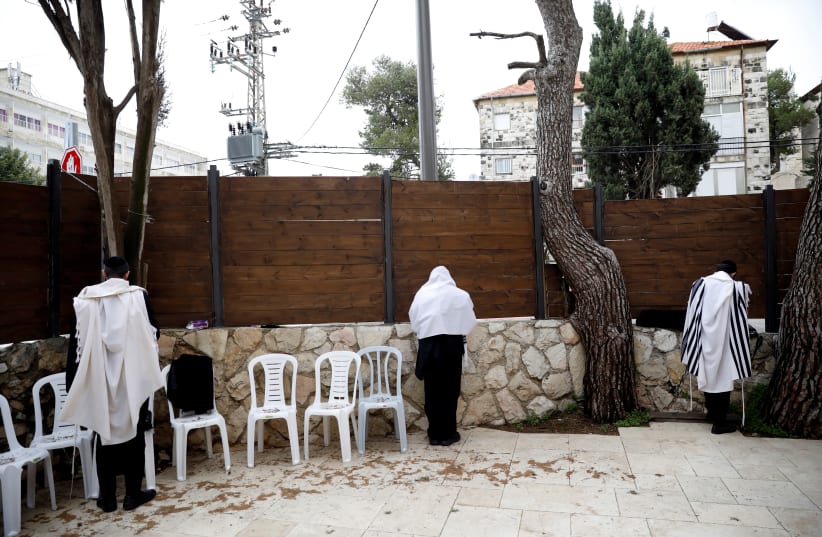The Tzohar rabbinical association of religious-Zionist rabbis has called on the religious public not to attend synagogue over Shabbat out of fear of further spreading the coronavirus disease.
The organization noted that other rabbinical associations outside of Israel have issued similar instructions, saying that the continued gathering of worshippers in synagogues could lead to hundreds of deaths.
Chief Rabbi Yitzhak Yosef ruled however that large synagogues should be closed, as should synagogues in hospitals, but that synagogues where the management can keep control of the worshippers and ensure that there are only ten people in a room at a time can be kept open.
The Tzohar association noted that many aspects of prayer on Shabbat require prayer participants to be in close proximity to one another which would contravene Health Ministry guidelines.
“How can one be expected to read the Torah alongside someone who is called up to the Torah and still stand two meters apart?” asked the Tzohar rabbis in a statement to the press.
“And is it really realistic to expect that no one will get close to the person next to them throughout the entire service? The reality is that many places tried to achieve these levels of separation over the past few days but were not successful.”
Tzohar noted that rabbinates in the UK and Switzerland, as well as many rabbis in the US, have completely shuttered their synagogues to stop the spread of the coronavirus, and insisted that synagogues in Israel act likewise.
“Do we really need to wait for dozens or hundreds of people to die, God forbid, before we understand that this is a matter of life and death?” the organization said, and “implored” communities to close their synagogues.
In a ruling issued on Wednesday, Yosef wrote however that some synagogues could remain open if they limit prayer services to ten people.
The chief rabbi insisted that all synagogues adhere to Health Ministry guidelines, stating “We totally trust the decisions of the doctors, and are obligated not to deviate from their instructions,” adding that the laws of Shabbat can be broken if necessary to help preserve lives.
Regarding synagogues, Yosef said that “if the community listens to the community managers synagogues can be left open,” but said that communities which cannot guarantee such control should close their synagogues.
Yosef also wrote that people who have been tested for coronavirus but are yet to receive the results or instructions as to what to do should leave their phones on during Shabbat and answer them if they believe it is the health services trying to contact them.
On Thursday, MK Omer Yankelevich said that she received calls that ultra-Orthodox Israelis with “kosher phones” were not receiving messages from the Health Ministry.
As a result, Yankelevich contacted the ministry and says that those with kosher phones will receive calls rather than texts.
The Health Ministry recently updated its recommendations for the public, calling on people to avoid person-to-person contact and keep a two-meter distance from one another.
The authorities also urged Israelis to stay home and refrain from going to public places. All entertainment facilities have been shut down and workplaces have reduced the amount of active employees to 30% as per the ministry's request.
Since the beginning of March, close to a quarter of a million people have registered as unemployed in Israel, according to N12.
Zaka Search and Rescue announced Thursday morning that it would deploy 32 ambulances in haredi (ultra-Orthodox) Jewish population centers as per the request of the Health Ministry, in order to be able to inform residents about coronavirus patients in the area.
Zaka added that it is examining the possibility of following the ministry's instructions in accordance with the organization's rabbis.
"These days, Zaka and its volunteers are on high alert for anything that may come," said the organization's director Yehuda Meshi Zahav. "The organization's volunteers are in nationwide deployment and are ready to respond at any moment."
Zahav continued, saying that Zaka has "supplied the volunteers with protective gear and specialized equipment designed to protect them."
He added that "this coming Shabbat, 32 Zaka ambulances will be deployed around the country in order to inform and alert the surroundings of a confirmed coronavirus patient, so that anyone who has been in contact with the person would enter quarantine in accordance with the Health Ministry's instructions."
